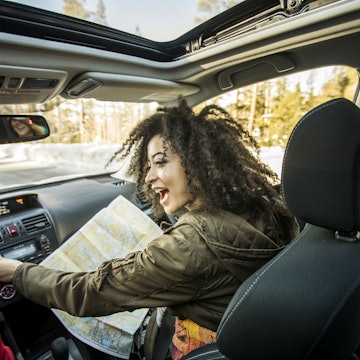
Why passport fees are just the first hurdle low-income travelers have to overcome
Jan 19, 2020 • 4 min read

Despite travel being more accessible than ever before, passports remain an expensive luxury for many would-be travellers around the globe living on a budget.

Throughout my teenage years, I had travelled vicariously through guidebooks, magazines and postcards. I longed to see the wonders of the world, to explore other shores and to soak in cultural sites. These dreams though wouldn’t be realised during my youth, as my family couldn’t afford the price of a passport, let alone a seat on the plane.
In the last UK census, 9.5 million Britons revealed that they didn’t hold a UK passport. At that time, in 2011, I was 16 and part of that statistic.
"When you have children, different priorities take over," my mum explained when I asked why she didn’t have a passport. "You can’t afford the £75.50 price tag when you drop down onto just one income."
The short phone call with my mum reinforced what I already knew. Whenever she had managed to save money for our dream holiday abroad, an emergency would arise that would inevitably deplete both our savings and our dreams.
I never wanted money, or lack thereof, to be a barrier. So, I saved. I saved pennies, pounds and any odd bits of shrapnel I could find in a tiny blue ceramic pot. Every Saturday, I deposited my meagre sums into my savings account and slowly, I watched it grow. In the end, it was my summer job that gave me the funds to afford a passport. After receiving my first paycheque, and on having no responsibilities, I took the plunge and bought the little burgundy book.
Upon reflection, I was fortunate. Many, however, are not.

Low-income families “need to prioritise their money on rent, food, clothing, or on something their children want/need,” explains Lisa Deply Neirotti, Professor of Tourism and Sport Management at George Washington University.
Similarly, only 57% of Australians and 42% of Americans are passport holders, according to both the Australian Department of Affairs and US census data respectively. While Americans who have passports have increased by 15% since 2007 – when a change in legislation occurred – many still find the $145 price tag (as a minimum) out of their range.
Hayley Mayer, a 25-year-old tech support worker from America, confides. “I have never had enough money to travel further than by car around my home.” After leaving home at 17, Hayley found it difficult to budget and only now has she accrued a nest egg.
On top of this, Hayley only has seven days holiday a year. Taking holiday days can also result in loss of earnings, which low-income families can ill afford to lose. “In 2018, 47% of American’s didn’t take all of their holiday days and 21% left more than 5 vacation days on the table,” confirms Professor Deply Neirotti.
Money is just one barrier low-income families face, finding and completing the application form is another. ‘Going online and figuring this [documents required for an application] could, alone be a barrier,’ says the George Washington University Professor.
‘It’s getting someone to sign the thing, that’s another issue,’ acknowledges my mum. Passport applications require someone from a listed profession to sign the documents to prove the applicant’s identity.

Until recently, UK residents could ask their doctor to sign their passport application – for a fee. However, this service no longer exists and has presented low-income families with a further barrier.
Once a passport is acquired, financial issues mount, as holidaymakers will need to fork out for the cost of the trip.
Sharmeen Suleman, speaker at the World Travel Market and Founder of the Family Holidays Club Facebook Group and Blog, supports this view: “The real struggle is that peak holiday times are often three times more expensive.”
She firmly believes that holidays are a luxury that low-income families literally invest in. The first investment, however, is the passport itself.
In 2020, at the age of 55, and after years of saving, my mum will be purchasing her first passport and our travel plans are well underway.
‘Realistically, Italy or Spain but if I were dreaming, and money was no object, Orlando or Australia,’ mum gushes. Regardless of the destination, our journey will be memorable.






















